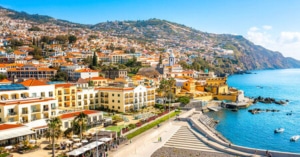
Top 10 Overseas Destinations for Remote Workers in 2025
Digital Nomad Visas create opportunities to live abroad while working remotely. Our guidance helps you explore the best destinations in 2025 for lifestyle, affordability, and
After a decade in the frenetic bustle of Abu Dhabi, following years in New York City, my family and I sought a new chapter as I approached retirement in 2022. Abu Dhabi had delivered adventure, a vibrant international community, excellent schools, and easy travel to Asia and Africa, but the pace began to wear on us. With two teenagers (14 and 16), we craved a slower, high-quality life closer to family in the U.S. After exploring Southeast Asia, five trips to Thailand and Malaysia, we found the distance too great. Europe became our focus, and Cyprus, specifically Paphos, emerged as the perfect blend of affordability, Mediterranean charm, and accessibility. Three years later, our move to this sun-soaked coastal city of 50,000 has transformed our lives, offering peace, community, and a lifestyle we never imagined possible with International Property Alerts.

Paphos, a former British colony, feels like a Mediterranean secret tailored for expats. English is widely spoken, with bilingual signs and services easing the transition. My wife’s mantra, “Follow the Brits,” guided us, as British expats have long flocked here for its mild climate (60s-80s°F year-round), pristine beaches, and low costs. Before moving, we researched extensively, YouTube videos, expat forums, and insights from friends of friends. My wife and kids visited first, followed by a solo trip by our son to confirm it was teen-friendly. Paphos checked every box: outdoor living, top-notch healthcare, fresh cuisine, and proximity to Europe’s cultural capitals via Larnaca or Paphos airports (1-2 hours away). For those considering investing, real estate in Cyprus offers a solid option.
Our initial worries, would a small town feel stifling? Would tourists overwhelm it?, faded quickly. Summer tourists cluster in Kato Paphos’ resort area, leaving the rest of the city serene. The tight-knit community, where shopkeepers and neighbors know your name, contrasts with Abu Dhabi’s anonymity. As an American-Brazilian family, we felt embraced, though night owls might find Paphos’ quiet vibe too tame compared to Dubai or Lisbon. For us, the tranquility, coupled with ancient ruins, azure seas, and a slower “Cypriot time”, is the heart of its charm.

Our routine reflects Paphos’ relaxed rhythm. At 7 a.m., we drop our son at the International School of Paphos, a top-rated institution with English-language programs. Then, my wife and I walk five miles along the Paphos Promenade, a scenic coastal path where waves crash and seagulls soar. The salty air and Mediterranean sunrise clear our minds, grounding us for the day. Afternoons are filled with our son’s activities, guitar lessons, soccer practice, or tutoring, while our daughter, now 19, studies in Amsterdam, a two-hour flight away. Evenings find us on our pool deck, watching the sun dip into the sea, a ritual that never loses its magic.
We rent a 4,500-sq-ft, four-bedroom, four-bathroom villa with panoramic sea views for €3,500 ($3,800) monthly. Perched at 500 feet elevation, two miles from the coast, it features private offices for my wife and me, spacious teen bedrooms, and a west-facing pool perfect for sunset cocktails. Compared to our $5,000/month New York apartment or Abu Dhabi’s high rents, it’s a steal, offering space and serenity we couldn’t afford in the U.S.

The food is a revelation. Paphos’ markets are brim with juicy figs, olives, and tomatoes, often costing €20 ($22) for a week’s groceries for four. We’ve embraced cooking, savoring Cypriot dishes like souvlaki, halloumi, and kleftiko (slow-cooked lamb) at home or tavernas like Muse Café (meals for two, €25/$27). The slower pace, shops close for holidays, prioritizing family over hustle, took adjustment but now feels liberating. We’ve ditched the “always busy” mindset, learning to savor long lunches and quiet Sundays.
The community surprised us. Though introverted, we’ve built friendships through our son’s school, local markets, and our landlords, a warm Cypriot couple who treat us like family. The expat scene, bolstered by British, Australian, and Scandinavian retirees, thrives via groups like the Paphos Expat Club, hosting coffee mornings and hikes. Our only gripe? Online shopping lags, deliveries from Amazon UK take a week and cost €15-€30 ($16-$32) in shipping. It’s a minor trade-off for a life unburdened by urban stress.
Paphos is 30-40% cheaper than coastal U.S. cities like Miami, where we’re from. A couple can live well on €2,800-€4,000 ($3,000-$4,300)/month, including rent (€1,000-€3,500), groceries (€200), and dining (€150). Our villa’s rent is high-end; two-bedroom apartments start at €800 ($860). Property purchases are affordable, a three-bedroom seafront condo costs €200,000 ($215,000) and the Category F visa (requiring €10,000/year income) makes residency straightforward for retirees or remote workers. Our EU passports (via Italy) simplified our move, but American friends secured Category F visas in months, needing only proof of income and health insurance.
Healthcare impresses. Doctor visits cost €30 ($32), and our family’s private clinic membership (€150/person/year) offers quick specialist access. Cyprus attracts European doctors for its lifestyle, ensuring high-quality care. Public transport, like buses to Limassol (€4), is reliable, but we rent a car (€300/month) for rural outings to Akamas Peninsula or Troodos Mountains. Language barriers are minimal, English dominates in shops, restaurants, and hospitals, though learning basic Greek or joining expat groups deepens connections. For newcomers, understanding the process of buying property in Cyprus is an important step.
Three years in, we’ve signed a two-year lease extension, a testament to Paphos’ hold on us. The slower pace, fresh food, and daily nature, whether hiking Coral Bay or swimming at Lara Beach, have improved our health and happiness. Financially, we live like royalty compared to Cypriot wages (average €1,800/month). We travel to Paris, Rome, or Athens for weekend getaways, all under three hours away, without breaking the bank. Socially, we choose our engagements, balancing solitude with community events like the Paphos Aphrodite Festival.
If I could advise my pre-move self, I’d echo my wife: “Follow the Brits, they’ve found a good life.” My seven years of research spreadsheets, forums, visits paid off, but the anxiety wasn’t needed. Paphos isn’t just a retirement destination; it’s a vibrant, affordable haven where we’ve rediscovered what it means to live well. To learn more, feel free to contact us.
Paphos offers year-round sunshine (60s-80s°F), low costs (30-40% less than U.S. coastal cities), English-speaking services, and a relaxed Mediterranean vibe, ideal for retirees and families, unlike pricier Western Europe.
A couple can live on €2,800-€4,000 ($3,000-$4,300)/month, including rent (€800-€3,500), groceries (€200), and dining (€150). A three-bedroom condo costs €200,000 ($215,000), far less than Miami or Lisbon.
The Category F visa (€10,000/year income, ~$10,700) grants residency for retirees or remote workers. EU citizens settle easily; non-EU applicants need income proof and health insurance, processed in months.
Yes, due to British influence, English is common in shops, restaurants, and healthcare. Basic Greek enhances local connections, but expat groups like Paphos Expat Club ease integration.
High-quality and affordable. Doctor visits cost €30 ($32); private clinic memberships (€150/year) offer specialist access. Public hospitals in Paphos and Limassol handle complex needs.
Mild, with 60s-80s°F year-round. Summers are dry and sunny; winters bring occasional rain. Perfect for outdoor activities like hiking, swimming, or walking the Paphos Promenade.
Limited unless remote work or tourism-related (e.g., teaching English). Most expats rely on pensions, investments, or digital nomad income due to language and permit barriers.
Buses connect Paphos to Limassol or Larnaca (€4-€7), but cars (€300/month rental) are ideal for exploring rural areas like Akamas or Troodos. Taxis are affordable (€10-€15 in town).
Welcoming, with expat groups hosting coffee mornings, hikes, and festivals (e.g., Paphos Aphrodite Festival). Locals are friendly, and tavernas like Muse Café are social hubs for expats and Cypriots.
Paphos Promenade, UNESCO-listed Tombs of the Kings, Paphos Archaeological Park, Coral Bay beaches, and day trips to Troodos Mountains or Limassol. Markets and tavernas offer fresh food and community.
About International Property Alerts
International Property Alerts is a premier global platform connecting real estate investors with handpicked opportunities in emerging and lifestyle-driven markets. Through curated listings, expert guidance, and market insights, we help buyers make confident property decisions worldwide.
Media Contact:

Phone: +44 7961 212181

Digital Nomad Visas create opportunities to live abroad while working remotely. Our guidance helps you explore the best destinations in 2025 for lifestyle, affordability, and

Madeira, Portugal offers tropical charm, affordability, and safety, inviting expats to enjoy a serene island lifestyle filled with natural beauty, cultural richness, and a welcoming

Dubai Islands is the city’s newest mega waterfront project—five islands with luxury villas, 80+ resorts, marinas, and lifestyle hubs. With property prices still far below
Compare listings
ComparePlease enter your username or email address. You will receive a link to create a new password via email.